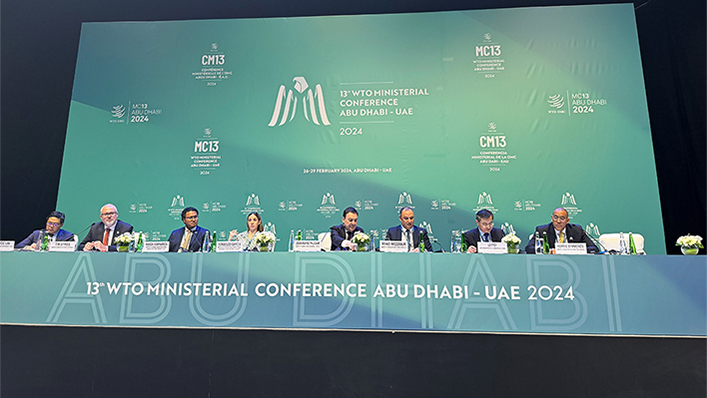A ministerial statement circulated by the six co-coordinators of the Dialogue on Plastics Pollution and Environmentally Sustainable Plastics Trade (DPP) — Australia, Barbados, China, Ecuador, Fiji and Morocco — Tuesday at the 13th Ministerial Conference (MC13) outlines trade-related actions to address the environmental, health and economic impacts of plastics pollution.
The statement proposes a series of actions to curb trade in harmful plastics, unnecessary single-use plastics and plastics packaging and to promote substitutes, such as bamboo or algae biomass.
Measures already being adopted by World Trade Organisation (WTO) members are reflected in a factual compilation attached to the statement. These measures include bans on single-use plastics, adopting eco-design and labelling requirements, and offering financial support and tax concessions for sustainable and safe non-plastic substitutes.
The release of the statement was announced by Sonsoles Garcia, Ecuadorian Minister of Production, Foreign Trade, Investments and Fisheries, Kerrie Symmonds, Barbados Minister of Foreign Affairs and Foreign Trade, Manoa Kamikamica, Fiji´s deputy Prime Minister and Minister for Trade, Ryad Mezzour, Moroccan Minister of Industry and Trade, Tim Ayres, Assistant Minister for Trade, Australia and Fei Li, Chinese Vice Minister of Commerce.
Minister Garcia said that the Ministerial Statement signifies a milestone achieved by the 78-member initiative on plastics pollution, as it sends a resounding political message that “trade and trade policy are an indispensable part of the solution to the plastic pollution crisis.”
She stated: “This commitment is timely as our environmental minister counterparts convene in Nairobi for the 6th United Nations Environmental Assembly and we look forward to negotiations in Canada towards an international legally binding instrument to end plastic pollution, aiming for a conclusion by the end of 2024.”
Minister Symmonds highlighted the urgency of addressing single-use plastics pollution, particularly for ocean-based economies such as Barbados.
“According to UNCTAD, the value of global exports in single-use plastics has doubled since 2005. And today, the value of global exports in the plastics industry is now around USD$1 trillion per year. Trade in plastics has become a global problem and trade policy must be part of a global solution,” he said.
Minister Kamikamica underscored the need to address plastics pollution throughout the whole life cycle of plastics.
He said, “We believe that addressing the plastics pollution requires a holistic solution that takes into consideration the whole lifecycle of plastics. On our part, Fiji is actively involved in all global forums advocating the need to address the plastics problem and the need to start eco-friendly plastic substitutes that are not harmful to our environment.”
Minister Mezzour shared concerns over the damaging environmental impact of single-use plastics products.
He said measures have been taken in Morocco to strengthen the traceability of these products and build the recycling value chain.
“We’re happy that 78 members, representing 85 percent of world trade, have joined the coalition. Single-use plastics pollution is a real issue for the planet. Let’s work hard to tackle this plastic pollution,” he said.
Assistant Minister Ayres of Australia said the statement manifested the collaboration among WTO members and the enhanced cooperation between the WTO and other international processes.
“No one country can tackle the plastics challenge alone. I can see what is emerging as a trend that the WTO is making sure that our trade architecture supports our global environmental imperatives. And that our trade work here and the trade architecture that we design doesn’t undermine the work of the other global institutions, particularly the environmental institutions, in fixing up our oceans and our environment,” he said.
Vice Minister Li emphasised trade’s critical role in addressing plastics pollution.
“This Ministerial Statement will reinvigorate actions to address plastics pollution and advance WTO reform. Our dialogue should continue to follow the principles of inclusiveness, transparency, balance and pragmatism, strengthen coordination with other international processes, and strike a balance between the environment, development and trade.” he said.
The ministerial statement outlines a set of actions that co-sponsors could take to reduce plastic pollution. The statement includes a compilation of policies already being pursued by WTO members. The actions include:
i increasing transparency of trade flows of plastics (e.g. of single-use plastics, plastic films and hard-to-recycle plastics) as well as those embedded in traded goods but not captured by trade data.
ii.reducing plastics that are harmful to the environment or human health, or unnecessary single-use plastics and plastics packaging.
iii.promoting safe and sustainable non-plastic substitutes, alternatives, services and technologies
iv.improving the capacity of developing countries to use trade as a tool to tackle plastics pollution
One point emphasised by the statement is the close cooperation between the Plastics Dialogue and other ongoing international processes, such as the work of the Intergovernmental Negotiation Committee (INC) and its engagement with the World Customs Organization in amending the Harmonized System (HS) for better tracking trade in plastic goods.
Launched in November 2020 by a group of WTO members, the Plastics Pollution Dialogue currently consists of 78 co-sponsors, representing 85 per cent of global trade.













